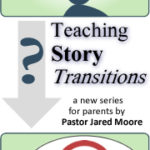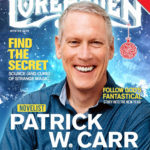How Fantastical Stories Explore Fantasy, Science Fiction, and Beyond
New Growth Press has released The Pop Culture Parent: Helping Kids Engage Their World for Christ.
I got to co-write this nonfiction resource. It’s my first book to be published.1 (Order from Amazon, New Growth Press, or 10ofThose.) Ted Turnau and Jared Moore are my coauthors. Blessed art they, especially given their work on this project for several years!
We went through several outlines and manuscripts, before arriving at a final release that best balances reader appeal and thematic depth.
The Pop Culture Parent back cover:
Knowing how to deal with popular culture as a parent can be overwhelming. How can you entered into your children’s lives and connect with their interests but still point them toward Jesus? Many parents fear the influence of popular culture or ignore it altogether. This guide equips parents to raise grace-oriented disciples and cultural missionaries in a post-Christian world.
At the Fantastical Truth podcast, we explored two key ideas from the book:
One chapter from an early manuscript version actually had the title Fantastical Stories: Exploring the Wonders of Fantasy, Science Fiction, and Beyond.2 We didn’t include this chapter in our final manuscript, so it wasn’t edited or anything. (I’ve only edited it here to update some links and style.) Still, I’m presenting it here as encouragement for parents—and anyone granted the mission of helping kids—to see fantastical fiction as a unique genre full of Christ-worshiping, gospel-sharing gifts.
(Original chapter draft) Fantastical Stories: Exploring the Wonders of Fantasy, Science Fiction, and Beyond
When Stephen turned ten, he received a birthday gift that made him terrified.
Stephen’s story: ‘But that book has a witch on it!’
The gift was a seven-book set I had scarcely heard about: The Chronicles of Narnia by C.S. Lewis. Not only the strange covers but the first book’s title caused me great spiritual concern: The Lion, the Witch and the Wardrobe. Um, that title has the word “witch,” and witches come out at Halloween, which isn’t a good thing, so why did you give me this book?
It turns out my parents may have checked with someone they trusted. Either way, I read Lewis’s first Narnia chronicle multiple times and have long since realized the titular witch was not the story’s heroine. Moreover, I grew to love the seemingly simple story.3
Then some years later I dared to pick up another “magical” book in a store, Harry Potter and the Chamber of Secrets. Christians are famous for their concerns over this series. So what would I find by randomly opening this book? I flipped to a chapter in which two boys, Harry and Ron, are trying to manage an enchanted flying car—a scene that was more like Mary Poppins or Charlie and the Chocolate Factory than Deuteronomy 18–style divination.
I started borrowing the Harry Potter books from the library. Instead of being tempted to witchcraft, I found joy in author J.K. Rowling’s story of where young heroes pursue magical learning while fighting a dark wizard. Now I look back on that time as one of thanksgiving to God for Rowling’s story that reflects many beauties and truths, including the Gospel.
How did I get off easy? Had I been compromised without knowing it? Was I allowing subtle evil influences in my mind and heart that? What about other fantastical stories with magic? What about Deut. 18? Or the New Age movement? Or maybe fantastical stories are okay, but only under certain conditions—such as if the story is an allegory, or if the author was a trusted Christian, or if there’s a clear Christ-figure who provides the power (as in Narnia)?
Fantastical stories have long dominated popular culture and their power is growing. Fantastical novels consistently crest bestseller lists,4 television franchises boast high ratings and numerous fans,5 and nearly all the top-earning 60 films have some form of fantasy.6 That wave has swept more children and grown-ups into waters filled with magic, spaceships, paranormal critters, and superheroes. But it’s left many Christian parents sputtering, unable to swim or unsure they should even test these waters.
Fantasy stories do present unique challenges for parents. To many of us, they are strange and weird and all-absorbing. And worse, if the stories truly include magic that the Bible directly bans, can we as a popular-culture shepherds even get near this field without stepping in thorns? If your children develop a taste for fantastical stories about even “made up” magic, won’t they be vulnerable to New Age cults, Wicca, or other pagan religions? And even if fantasy stories are not technically evil, what is the real point of all these absurd and imaginary worlds? Aren’t Christians called to gospel mission in the real world?
Exploring the God-exalting purpose of fantastical stories
So how can parents begin to guide their children into stories set in strange new worlds?
These fantastical fields of popular culture do warrant special considerations, especially when parents are less familiar with fantastical stories or their purposes. So let’s discover why fantastical stories are not simply “neutral” but are 1) glorious reflections of our epic God shown in Scripture, 2) a long tradition of Christ-exalting fantastical storytelling, 3) and thoroughly human joys and wonders that nonfiction and even other fiction cannot equal.
1. Fantastical stories have roots in Scripture.
Our faith is based on God’s epic real-life fantastical Story. In earlier chapters, we recalled that the story’s Hero is also the Author. Its plot is the gospel in which Jesus Christ fights to slay the dragon of sin and usher in the perfect Kingdom. Its redeemed characters are God’s people: the Church. Its world is our world. The Bible spans multiple genres that describe this cosmic true story in fantastical terms. Scripture often includes accounts of true miracles. But sometimes Scripture includes straight-up fantasy tales or references:
- Genesis is a historical record. But it’s written with a fantastical and poetic edge, a “true myth” that still inspires epic fantasy writers who also enjoy creating “worlds.”
- Exodus is also historical record. Yet the narrative breathlessly recounts the wonder and strangeness of God’s miraculous plagues and God’s epic rescue of his people.7
- Judges 9 includes the Bible’s first recording of a straight-up fairy-tale-like fable with obviously fantastical images such as a talking tree. This is another small reminder that in order to understand some of Scripture we must be familiar with fantasy.
- Scripture alludes to at least one fantastical book that lies outside most Protestant Christians’ accepted canon, the book of Enoch (Jude 1:9 and possibly 1 Peter 3:19).
- No matter how you interpret Revelation, all Christians agree the book is full of fantastical imagery. Some Christians believe Revelation describes literal future events such as earthquakes, a storm of blood-rain and hail, meteor strikes, demon locusts and horsemen, and drastic plagues of global cooling and warming. But even Christians who believe the book uses fantasy images to describe heavenly realities or earthly history must contend with Revelation’s apocalyptic symbols and themes.
Therefore, parents can happily dismiss any notion that fantastical stories are something foreign to Scripture. Clearly God believed that making the true gospel a fantastical story—and even including fictitious fantasy tales on the way—was best for his self-revelation.
2. Fantastical stories have deep roots in Church history.
Occasionally we encounter Christians who do recognize Scripture’s fantastical elements. But they often wonder if it’s really wise for Christians to endorse, enjoy, or even create fantastical stories that are not themselves part of Scripture. In response we hearken back to a long and glorious tradition of fantastical stories in the history of the Church:
- Christians spread legends about martyrs and saints such as the bishop Nicholas, who remains a “magical” figure even in his modern iconography of Santa Claus.
- Monks wrote medieval tales such as the Old English epic poem Beowulf in the late first millennium, whose story blended biblical and pagan images and themes.
- The Italian poet Dante’s 14th century Inferno gave fantastical explorations of hell—ideas that linger in popular-culture phrases, stories and video games. If you’ve heard the expression “circles of hell” or the famous warning supposedly written over hell’s gate “Abandon all hope ye who enter here,” you have been influenced by Dante.
- John Milton (1608–1674) wrote the epic poem Paradise Lost that offers a fantastical retelling of Adam’s and Eve’s rebellion, and John Bunyan (1628–1688) wrote the fantastical Christian-life allegory The Pilgrim’s Progress.
- The English preacher Charles Spurgeon is rightly credited with fierce dedication to expositional preaching of the Bible. Yet he often offered extra-biblical speculations about biblical narrative truths in light of common sense about human nature.8
- The “patron saints” of fantastical fiction, J. R. R. Tolkien and C. S. Lewis, saw no conflict between their loves for ancient languages, mythologies, medieval and Renaissance literature, and their passion for Jesus Christ and biblical faith. Both wrote fantastical novels and stories. They also wrote nonfiction defenses of fairy tales, fantasy stories, and so-called “escapism” as effective ways to engage real-world spiritual realities.
- Many authors of modern evangelical fiction also honor the Church’s long history of exploring faith in fantastical stories. These include the spiritual-warfare thrillers of Frank Peretti (such as This Present Darkness, 1986), the end-times novels of Tim LaHaye and Jerry B. Jenkins (the Left Behind series, 1995–2007),9 and many other fantastical tales by Christians that draw from fantastical story traditions. “Secular” creators also draw heavily from this fantasy tradition inspired by the biblical plot. Screenwriter Joseph Campbell used the term “monomyth” to describe this “hero’s journey,”10 and many storytellers follow his formula almost religiously. This is why many fantasy or superhero stories, from Harry Potter to The Avengers series, show a new hero being “born,” fighting enemies, “dying,” and rising to win the victory.
We can be assured that fantastical stories are not something that secular popular-culture creators made up within the last few decades. Christian storytellers and story-listeners have been exploring fantastical tales for centuries. What has more often afflicted the church is not the fantastical imagination in fiction, but the sinful abuse of fantastical imagination in teaching, such as authors or leaders who spread false doctrines as if they are nonfiction.11
3. Fantastical stories explore real-world joys and wonders
What about the notions that “fantasy is not realistic” or that “fantasy is just for children”?
Alas, we often hear these assumptions among Christians who love the term “gospel-centered” and who prioritize nonfiction doctrine, expositional preaching, and systematic theology. They also encourage Christians to explore books such as history, biography, and current events. For example, Southern Baptist Theological Seminary President Dr. Albert Mohler gives annual book recommendations on his blog that usually include all genres except fiction.12 Other gospel-centered ministries review nonfiction titles (or evangelical titles purporting to be nonfiction), but their ministries do not usually cover fiction, much less fantastical fiction. Ultimately this could give Christian parents the impression that “gospel-centered” living should lead us to read only grown-up, serious, nonfiction genres such as biography and history. Oh, occasionally we might dip our toes into fiction, such as classic literature or novels by Lewis and Tolkien. But we consider these exceptions to the rule of “normal” reading, or at best harmless diversion that don’t actually relate to real life.
We can certainly learn and enjoy systematic theology, biography, and history to glorify God. But dismiss fantasy as “unrealistic” or assume it’s only for children, we’re actually the ones who are practicing immature “escapism” that is based on at least two games of pretend.
Our first pretend-game is that God’s world today, even a world that groans for redemption (Rom. 8), is not wondrous and strange and amazing. But this view itself is not realistic. The biblical Psalmists model postures of poetic delight in the world God has made, a delight that children and grown-ups must imitate! Only then are we further moved to worship God, the Creator of this true-life “realistic” but fantastical universe. N.D. Wilson notes:
We’re [living] on a ball of rock flying at Mach 86 through outer space around a ball of fire in the sky. What kind of story are we telling? We’re immediately in the sci-fi/fantasy section of the bookstore, embarrassed, hoping our real academic friends won’t see us. That’s this world. … [Christians mustn’t react to author C.S. Lewis like,] “Well, we like him ‘cause he said good things in nonfiction, and [fantasy is] good for children.” These are good for us because the world is wonderful. It is fantasy. It’s not realism as we would call it. And we need to get our eyes open and be more childlike, the way Lewis was and the way all the saints in heaven are, at least now.13
As Christian grown-ups, we shouldn’t show children with our “realistic” behavior that it’s wrong to delight in God’s creation or to feel anticipation for New Earth. Nor should we try to train such “childish” desires out of ourselves! Instead let us act out our growing spiritual maturity by remembering this: Much of our “grown-up” business, many of our church and family politics, and even some of our doctrine battles are only temporary necessities that won’t be part of eternity. Let us learn and teach our children instead that God has promised to redeem this groaning creation and renew creation into a fantastical world for eternity.
Parents often feel at a loss with popular culture and how it fits in with their families. They want to love their children well, but it can be overwhelming to navigate the murky waters of television, movies, games, and more that their kids are exposed to every day.
Popular culture doesn’t have to be a burden. The Pop Culture Parent equips mothers, fathers, and guardians to build relationships with their children by entering into their popular culture–informed worlds, understanding them biblically, and passing on wisdom.
This resource by authors Jared Moore, E. Stephen Burnett, and Ted Turnau provides Scripture-based, practical help for parents to enjoy the messy gift of popular culture with their kids.
Order The Pop Culture Parent from:
- This preparation, along with a crucial foster-care transition and moving to a completely different house, have restricted my Tuesday articles of late! ↩
- It’s fascinating to see here some verbiage that helped sharpen the Lorehaven mission just a few years later. ↩
- Without God’s work through the life, stories, and nonfiction books of C.S. Lewis, I (would likely not care today for biblical doctrine, a Christian view of popular culture or storytelling, or Jesus Christ himself. ↩
- See The Guardian, “The top 100 bestselling books of all time: how does Fifty Shades of Grey compare?”, Aug. 9, 2012. Harry Potter titles top the 2012 list, joined by Dan Brown’s conspiracy thrillers such as The Da Vinci Code and E.L. James’ pornographic tales such as Fifty Shades of Grey. ↩
- See Rotten Tomatoes, “Top TV.” ↩
- See Internet Movie Database, “IMDb ‘Top 250’ (Sorted by US Box Office Descending).” Even the non-fantastical exceptions in the first sixty films on the list usually include fantastical elements. For example, Forrest Gump explores a fantastical revisionist history. ↩
- See N. D. Wilson, “The Lie of Realism,” talk at Desiring God conference. “Harry Potter versus Voldemort is in a grand and very lengthy tradition, and it all goes back to when an old dude walked into the court of an emperor in Egypt a long time ago, leaning on a stick. Oh my goodness—a magic stick. That’s the first one.” ↩
- See Charles Spurgeon (ed. Robert Hall), Spiritual Warfare in a Believer’s Life, page 91 (Lynnwood, WA: Emerald Books, 1993). Spurgeon explores the biblical accounts of Satan’s temptations of Jesus and speculates that Jesus at the Temple pinnacle was actually afraid of falling, making Satan’s temptation even greater for Jesus to cast himself down. “It is consistent with the well-known laws of consciousness that we are often tempted to do the very thing that we are afraid of doing and to do it to escape from it,” Spurgeon observes. ↩
- Some readers confuse these novels with reality, presuming that demons are actually named after specific sins in Peretti fashion or that end-times events will be like those described in the Left Behind series. But these confusions should lead us to insist on greater comprehension of fiction that touches on biblical themes, rather than leading us to conclude that readers who misunderstand fiction should limit Christian storytellers. ↩
- Joseph Campbell, The Hero With a Thousand Faces, third edition (Novato, CA: New World Library, 2008). ↩
- Arguably Christians are more often deceived by fantastical tales that have been written and marketed as “true stories,” such as books that purport to describe true near-death experiences or journeys to heaven. ↩
- One of us (Stephen) was able to hear Dr. Mohler explain his reasons during a Feb. 10, 2014 question-and-answer session at the University of Texas at Austin. Mohler said he avoids giving fiction recommendations partly because readers respond to fiction far more personally than they do nonfiction. Mohler said he believes readers would react negatively if he recommended a novel that included portrayals of sin or false beliefs. ↩
- N. D. Wilson, “The Lie of Realism,” talk at Desiring God conference.
Second, if we act as if fantasy is unrealistic or only for children, we pretend that we should not anticipate God’s promised world of tomorrow: the real-life fantastic world awaiting all the captives Jesus has set free. Tolkien called this a better definition of the term “escapism”:
Why should a man be scorned if, finding himself in prison, he tries to get out and go home? Or if, when he cannot do so, he thinks and talks about other topics than jailers and prison-walls? The world outside has not become less real because the prisoner cannot see it. In using escape in this way the critics have chosen the wrong word, and, what is more, they are confusing, not always by sincere error, the Escape of the Prisoner with the Flight of the Deserter.[14. J.R.R. Tolkien. The Tolkien Reader (New York, NY: Random House, 1984). ↩








































